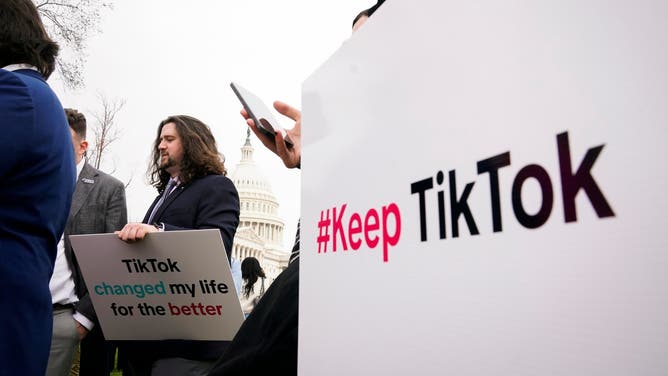TikTok Faces Sale Or Ban In The United States As A National Security Risk
The future of TikTok in the United States hangs in the balance, after President Joe Biden signed a bill on Wednesday targeting its parent company, ByteDance.
Discussions around a potential sale or ban of TikTok have intensified in recent years, as the platform's influence has grown, especially among younger users. Those discussions came to a head as the new restrictions were signed on Wednesday.
Opponents of TikTok have said the app is a threat to national security, targets users of all ages with propaganda and collects user data. While proponents have maintained that the app is independent from the Chinese government, fears have grown that the Chinese Communist Party could easily, and likely already has, demanded ByteDance share data and user information taken from TikTok.
For their part, the app has already signaled their intention to challenge the requirement to sell in court.
According to Fox News, TikTok's head of public policy for the Americas, Michael Beckerman, sent a memo to employees on Saturday saying, "At the stage that the bill is signed, we will move to the courts for a legal challenge."
A further statement said the requirement amounts to an unconstitutional ban, "This unconstitutional law is a TikTok ban, and we will challenge it in court," the company said in a statement. "We believe the facts and the law are clearly on our side, and we will ultimately prevail."
But should they?

Protesters outside of the United States Capitol as the House voted and approved a bill Wednesday that would force TikTok’s parent company to sell the popular social media app or face a practical ban in the U.S.
TikTok Presents Clear Danger, But Raises Overreach Questions
There's little doubt that TikTok is a clear and present danger given its power, reach and influence among younger viewers.
It's become the single most important social media platform, capable of launching trends, changing opinions and launching careers. It's also almost certainly controlled, at least in part, by the Chinese Communist Party.
And virtually everything of influence controlled by the Chinese Communist Party is a significant threat to the United States and Western democracies. The CCP is relentless in its goals and ambitions of sabotage and undermining the US and its culture. While it's easy to become complacent about the threat the CCP poses, the Chinese government is anything but.
Movies, television, anything that can be seen as even the slightest criticism of the CCP or its leader is censored or banned. But do we want to become like them, censoring conversations on an app because it might pose a threat to us?
What Do We Do With TikTok Instead?
Divestiture is a much better outcome; while ByteDance claims independence, it's impossible to believe that they don't share data and information with the Chinese government. Least of all because it's a requirement for Chinese companies to do so on request.
It's also impossible to believe that the CCP would tolerate an American app with the kind of pernicious, sophisticated data collection of TikTok to become the dominant social media platform in China. Especially if that app was sharing private information on preferences, demographics and support with the U.S. government.
It's hard to justify an outright ban of TikTok, even if the algorithms and programming is designed to undermine the U.S. But shifting control of it to an entity not beholden to the CCP would be a tremendous victory.
The anti-semitic protests seen on college campuses are undoubtedly influenced by conversations on TikTok, which are propagated by an algorithm designed to foster such extreme outcomes.
Whether or not this bill leads to a forced sale of TikTok remains to be seen, but it's more likely now than it was before. And that's a good thing for all parties involved. Except the Chinese government.